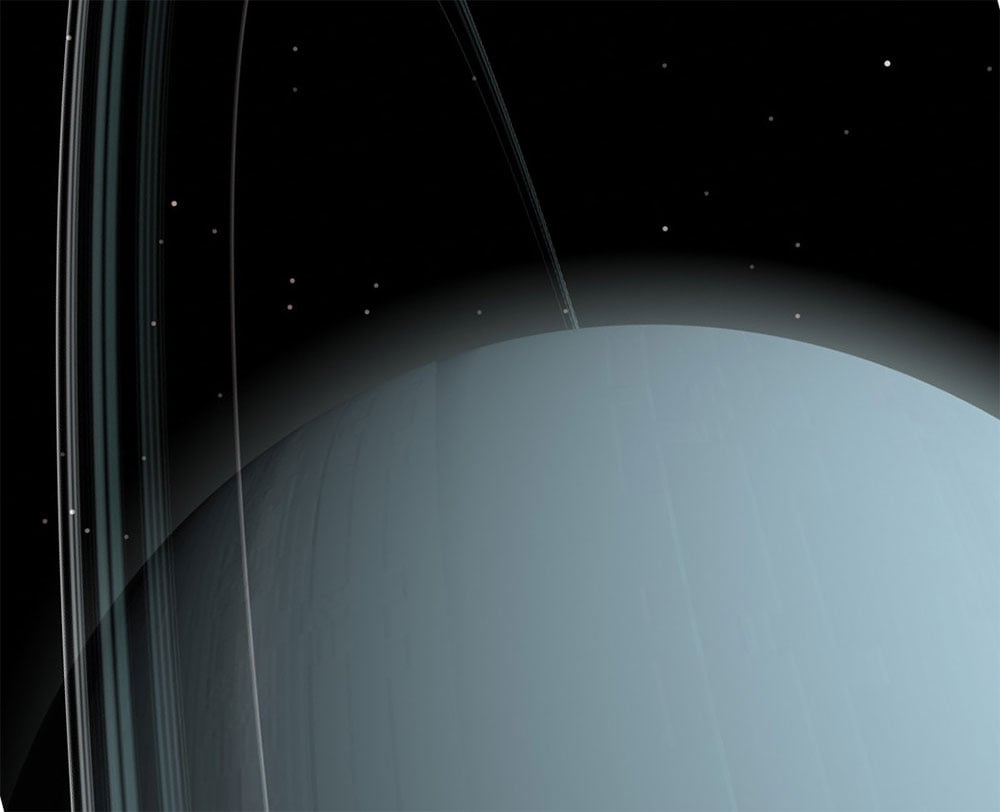Planet URANUS
A look at the origins, meaning and usage of the place name "URANUS". For word definitions see WordChecker belowBackground
Uranus is the coldest of the eight planets in our solar system. Located beyond Saturn, Uranus is the seventh planet from the Sun, at a distance of 2,870 billion kilometres. With a diameter of about 51,000 km it is the third largest planet. Uranus has twenty-seven moons and a ring system. Its upper atmosphere gives it a distinct bluish-green colour. Under normal conditions, Uranus cannot be seen from Earth with the naked eye.
Pronunciation: /ˈjʊə.rən.əs, jʊ.ˈreɪ.nəs/
Origins, meaning and usage of the name
Uranus was not known to the ancients, who had no telescopes to observe it. It was discovered in 1781 by William Herschel, a German-born astronomer living in England, using a six-inch telescope. The naming of Uranus proved to be a difficult and long drawn-out affair. It was almost 70 years after its discovery that the name was universally agreed upon. Herschel gave it the Latin name, Georgium Sidus (“The Georgian Planet”) in honour of his benefactor, King George III of England. This name, however, was unpopular outside England and in 1782 the German astronomer Johann Bode proposed the name “Uranus” — from Ouranos, the ancient Greeks’ god of the sky. He argued that just as, in mythology, Saturn was father to Jupiter, so Uranus was father to Saturn. In 1789 Bode’s proposal received support when a German chemist named his newly-discovered chemical element “Uranium” after the “planet Uranus”. The name suggested by Bode eventually gained widespread acceptance, even officially. Uranus is the only planet, other than Earth, not to be named after a Roman deity.
The adjective from Uranus is Uranian (capitalized as derived from a proper noun), as in: The Uranian atmosphere is the coldest in the solar system. Fictional inhabitants of Uranus are known as Uranians, and they have featured, along with the planet and its moons, in various works of fiction.
Although Uranus can be pronounced in two ways (see the audio and phonetic versions above), both are acceptable. For a useful and humorous take on the two variations take a look at this YouTube video.
Above: Uniquely among the planets, icy Uranus — the Greek sky god — acrobatically orbits on its side, with its faint rings nearly perpendicular to its orbital plane.
Example sentences:
- The Voyager 2 spacecraft got within 50,600 miles of Uranus.
- The Uranian year is equivalent to eighty-four Earth years.
Above: “Uranus, the Magician” is the sixth movement of The Planets, written by the English composer Gustav Holst between 1914 and 1916. Its mixture of ominous and humorous tunes and its boisterous, lolloping gallop preceding a magical hush well become this icy and mysterious god of the sky that uniquely orbits on its side.
solar system (noun): our sun and the eight planets (and other bodies) that go around it
billion (noun): one thousand million (1,000,000,000)
naked eye (noun): unassisted vision; the eye without help from a telescope
the ancients (noun): people of the distant past, especially the ancient Greek and Romans
Latin (noun): the language of the ancient Romans
benefactor (noun): a person who gives money or supports; a sponsor
deity (noun): god or goddess
acrobatically (adverb): in a spectacularly gymnastic way
perpendicular (adjective): at an angle of 90 degrees
orbital plane (noun): an imaginary flat surface joining the Sun and the planet as it orbits (goes around) the Sun
boisterous (adjective): noisy and cheerful
lollop (verb): move in an ungainly way
gallop (noun): the fastest pace of a horse
 Uranus is the coldest of the eight planets in our solar system. Located beyond Saturn, Uranus is the seventh planet from the Sun, at a distance of 2,870 billion kilometres. With a diameter of about 51,000 km it is the third largest planet. Uranus has twenty-seven moons and a ring system. Its upper atmosphere gives it a distinct bluish-green colour. Under normal conditions, Uranus cannot be seen from Earth with the naked eye.
Uranus is the coldest of the eight planets in our solar system. Located beyond Saturn, Uranus is the seventh planet from the Sun, at a distance of 2,870 billion kilometres. With a diameter of about 51,000 km it is the third largest planet. Uranus has twenty-seven moons and a ring system. Its upper atmosphere gives it a distinct bluish-green colour. Under normal conditions, Uranus cannot be seen from Earth with the naked eye.